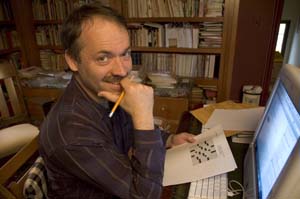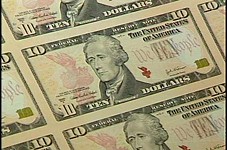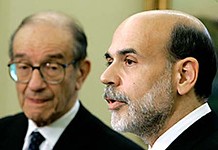
Wordplay
2006, PG, 94 min. Directed by Patrick Creadon.
REVIEWED By Marjorie Baumgarten, Fri., June 23, 2006
Although he's now an award-winning television star, Jon Stewart has not fared quite as well with his movie career, which has generally veered toward terrible choices and flat performances. So, it's a delight to see him here in Wordplay, a documentary about crossword puzzles and their ardent fans, with specific focus on the daily puzzles in The New York Times; their editor, Will Shortz; and the American Crossword Puzzle Tournament, where hundreds of contestants annually compete for the title of champion. Stewart is one of the many fervent NYT puzzle-solvers who talk about their crossword compulsion for this film and add color, humor, and intensity to this world of black-and-white squares. Hands down, he's the funniest – "I will solve a USA Today in a hotel, but I don't feel good about myself" – but under any other circumstances it would be difficult to put together a group of individuals as versatile and diverse as the one Creadon gathers here. President Bill Clinton, Yankee pitcher Mike Mussina, filmmaker Ken Burns, the Indigo Girls music duo – all are among the puzzle's famous devotees who talk about their daily fix on camera. In pen or in ink? How to fold the paper correctly? Who's allowed to look over your shoulder? Everyone has an opinion. At first glance, it would seem that watching puzzlers work their solitary crosswords would be about as much fun as watching the proverbial paint dry. But that supposition is proved wrong by Creadon, whose camera manages to catch a sense of the mind's elasticity as unseen neuronal firings set off synaptic deluges that suddenly connect with the certainty of a hole in one (or a cartoon lightbulb appearing over one's head). The most fascinating segment of Wordplay simply watches as puzzle-creator Merl Reagle constructs one. So much of the ability to solve these difficult puzzles remains ineffable. We're told that musicians and math types tend to be best at the task because their minds are more able to see strings of letters as elastically as they see groupings of notes or numbers. The king of the puzzlers is Shortz, who presides over the convention he founded as steadfastly as he edits the Times puzzles. After selling his first puzzle at the age of 14, Shortz went on to create his own college study program in a field he terms enigmatology. Creadon fumbles a bit as the film focuses too much on the tournament in the latter half. The approach seems too close to the narrative strategy of the popular documentary Spellbound to feel original. However, the fact that Wordplay works as a film at all is a testament to its skill. The New York Times may never find a better marketing tool.
A note to readers: Bold and uncensored, The Austin Chronicle has been Austin’s independent news source for over 40 years, expressing the community’s political and environmental concerns and supporting its active cultural scene. Now more than ever, we need your support to continue supplying Austin with independent, free press. If real news is important to you, please consider making a donation of $5, $10 or whatever you can afford, to help keep our journalism on stands.









